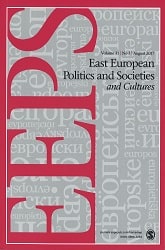Yugoslavia’s Open-Door Policy and Global Tourism in the 1950s and 1960s
Yugoslavia’s Open-Door Policy and Global Tourism in the 1950s and 1960s
Author(s): Igor TchoukarineSubject(s): Political history, Government/Political systems, International relations/trade, Politics and society, Post-War period (1950 - 1989), Tourism, Sociology of Politics
Published by: SAGE Publications Ltd
Keywords: tourism; passport; mobility; Yugoslavia; Eastern Europe;
Summary/Abstract: In post-Stalin Eastern Europe, international tourism occupied a paradoxical position. For practical and ideological reasons, socialist states continued to implement stringent passport regimes and strictly regulated the movement of people to and from their territories. At the same time (and for similar reasons), socialist entities were also compelled and enticed, albeit with hesitations, to allow their citizens and foreigners to temporarily move across their borders. Examining the tension between these policies and practices, this article explores how political and tourist institutions in Tito’s Yugoslavia negotiated and engaged with mobility by Yugoslav citizens and visitors, gradually leading to the country’s “open-door policy” of the 1960s. This policy—and with it, international tourism—became a trademark of sorts for Yugoslavia’s atypical socialism and, as Yugoslav officials and tourism experts often claimed, served both as a reflection of and a channel for the expression of the country’s distinct foreign policy and socioeconomic agenda. Though Yugoslavia’s engagement with global tourism was hardly unique during the Cold War, the country’s rapid transformation to a relatively successful and recognized tourist destination in the 1960s was remarkable and typically a step ahead of other socialist states. The article argues that this transformation occurred through the enaction of liberal mobility policies that intelligently intersected with the country’s foreign policy. Through this, it asserts, Yugoslavia set itself apart in many respects, particularly in terms of its mobility and tourism practices, which were, for the most part, in tune with Western standards.
Journal: East European Politics and Societies
- Issue Year: 29/2015
- Issue No: 01
- Page Range: 168-188
- Page Count: 21
- Language: English
- Content File-PDF

